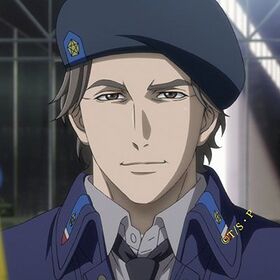Harry Kurosawa
This article is incomplete because it is pending further input from participants, or it is a work-in-progress by one author. Please comment on this article's talk page to share your input, comments and questions. Note: To contribute to this article, you may need to seek help from the author(s) of this page. |
Harry Kurosawa | |
|---|---|
 Kurosawa in 1944 | |
| Born | 18 August 1910 Regina, Saskatchewan, Rubrum |
| Died | 18 February 2011 (aged 100) Regina, Saskatchewan, Rubrum |
| Buried | Regina Heroes Memorial |
| Allegiance | |
| Service/ | |
| Years of service | 1930 - 1975 |
| Rank | Lieutenant-General |
| Commands held | Third Rubrumian Army Royal Regina Rifles |
| Battles/wars | Estharian Civil War War of Lorican Aggression |
| Awards | Distinguished Service Cross Distinguished Service Honor Legion of St. Georgius Military Medal Second Europan War Victory Medal Joyonghean Honors Order of His Sovereign Highness Order of the Taegeuk Cordon for Distinguished Service Joyonghean Army Honor Medal |
| Relations | Murakamo Susaya (mentor) Tasaku Mitsuru (mentor and friend) Murasame Susaya (aide-de-camp and student) |
| Other work | Professor at the University of Saskatchewan |
General Sir. Harry Kurosawa KG, GCB, CLE, RD, COR (18 August 1910 - 18 February 2011) was a Rubrumian senior officer who rose to fame for his efforts during the Estharian Civil War and in the Second Europan War under his mentor General Murakamo Susaya. Kurosawa was known for his fast deployments in the battlefield and his ability to shift into different styles of warfare, which his mentor pioneered.
Kurosawa was the son of a Rubrumian-Nihhonese officer and a Nihhonese mother. Although he grew up under his mother's care, his father got him interested in military life. Kurosawa found himself in a close relationship with his mentor, then-Captain Tasaku Mitsuru. The two shared a close bond until Kurosawa graduated in 1928. He soon found himself enlisting in the Rubrumian Army and here, he met General Susaya. He found himself under the General's close supervision when he was deployed to Esthar during the Civil War in 1932. Kurosawa showed promise when his brigade of Rubrumian volunteers managed to catch Republican troops off-guard, allowing A.C.G. Linholm''s Nationalists to push and take Teruel. He was promoted to Major as a result by Susaya himself.
He found himself in the heat of battle once again, this time during the Second Europan War, where he performed incredible feats of manoeuvres that found Allied formations overcoming Imperial forces. He continued to rise through the ranks, becoming the youngest Rubrumian General at the age of 28 after his promotion to Brigadier. He became a full General in 1943 at the age of 33, which saw him his reassignment to Joyonghea, where he was reunited with his college professor. He also met General Susaya's son, Murasame Susaya and hoped that he had his father's calibre. He put a lot of trust on the young Susaya, taking him and his friends under his wing, a nod to his mentor's role in life. His success during the Rubrumian Landings put General Douglas Tecumseh Stilwell and half of the Concordian forces to be sent to the Gangbaek Theater and endorsed General Jacob Cedric Cunningham to replace him as the commander of the Concordians that remained in the mainland.
Kurosawa later served with distinction, helping out in the Post Second Europan War Crisis of 1945 and later during the War of Lorican Aggression until his retirement in 1975 at the war's end. He returned home and became a military professor for aspiring students at the University of Saskatchewan and in the University of St. Georgius, in which one of his students was future Field Marshal Kiriya Kitagawa.
Kurosawa left a lasting legacy across many military organisations in the Commonwealth. His flexibility in warfare has been thoroughly studied in many military academies to this day. Many military historians and generals have credited him as having perfected the fast manoeuvre and Envelopment style of warfare.